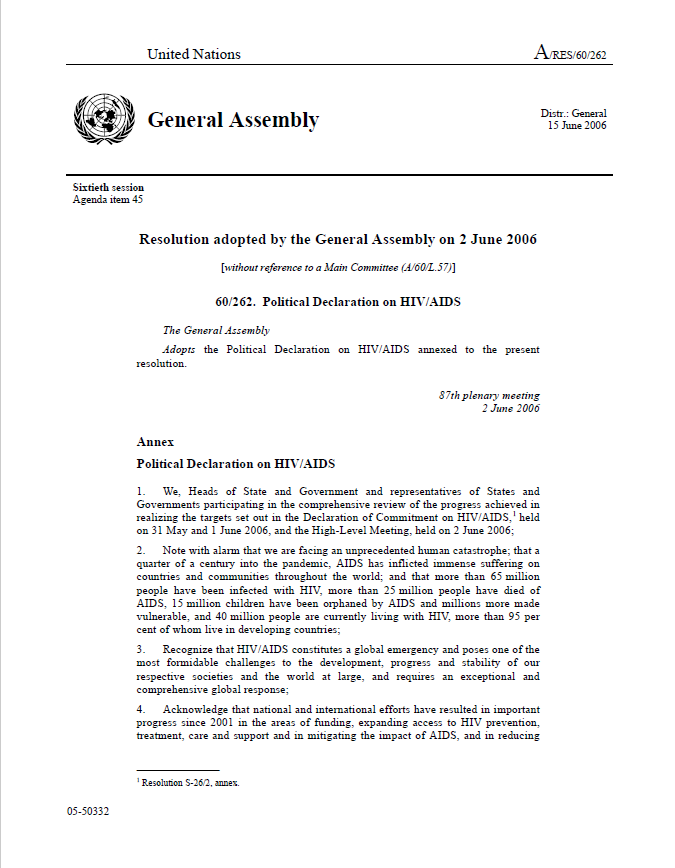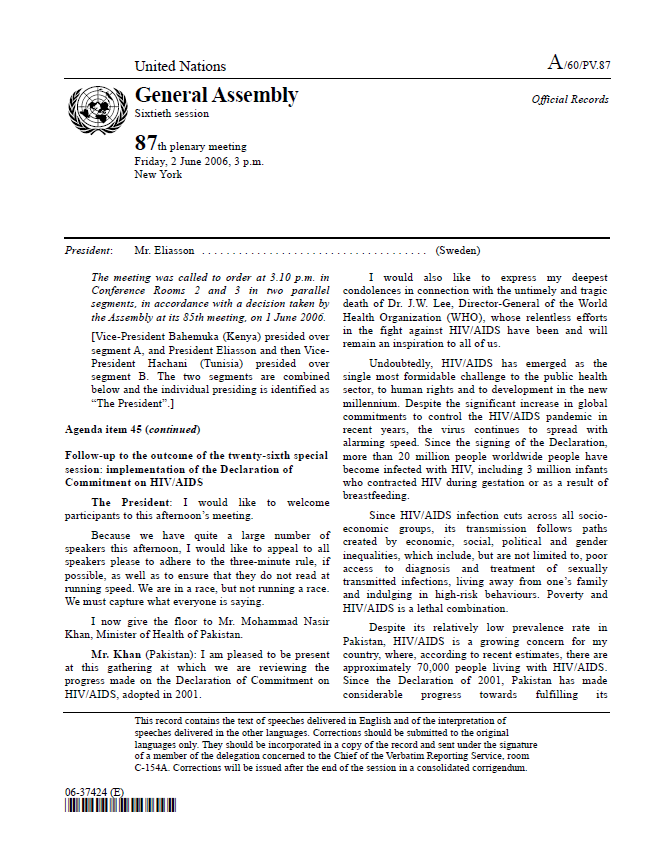2006 Political Declaration on HIV/AIDS
Analysis of precedential value
This document is the product of the UN High-Level Meeting on AIDS in June 2006; “the Declaration was adopted unanimously after the Assembly had heard from over 150 speakers today, including 11 Heads of State or Government and numerous other high Government officials.” The General Assembly is the preeminent governing body of the UN system and consists of all 193 UN Member States.
Used as precedent
harm reduction
“Reaffirm that the prevention of HIV infection must be the mainstay of national, regional and international responses to the pandemic, and therefore commit ourselves to intensifying efforts to ensure that a wide range of prevention programmes that take account of local circumstances, ethics and cultural values is available in all countries, particularly the most affected countries, including information, education and communication, in languages most understood by communities and respectful of cultures, aimed at reducing risk-taking behaviours and encouraging responsible sexual behaviour, including abstinence and fidelity; expanded access to essential commodities, including male and female condoms and sterile injecting equipment; harm-reduction efforts related to drug use; expanded access to voluntary and confidential counselling and testing; safe blood supplies; and early and effective treatment of sexually transmitted infections.” (paragraph 22)
positive legal determinants
“Commit ourselves to overcoming legal, regulatory or other barriers that block access to effective HIV prevention, treatment, care and support, medicines, commodities and services.” (paragraph 24)
“Commit ourselves to intensifying efforts to enact, strengthen or enforce, as appropriate, legislation, regulations and other measures to eliminate all forms of discrimination against and to ensure the full enjoyment of all human rights and fundamental freedoms by people living with HIV and members of vulnerable groups, in particular to ensure their access to, inter alia, education, inheritance, employment, health care, social and health services, prevention, support and treatment, information and legal protection, while respecting their privacy and confidentiality; and developing strategies to combat stigma and social exclusion connected with the epidemic.” (paragraph 29)
bodily autonomy and integrity, positive legal determinants
“Pledge to promote, at the international, regional, national and local levels, access to HIV/AIDS education, information, voluntary counselling and testing and related services, with full protection of confidentiality and informed consent, and to promote a social and legal environment that is supportive of and safe for voluntary disclosure of HIV status.” (paragraph 25)
bodily automomy and integrity, comprehensive sexuality education, gender equality, reproductive rights, sexual rights
“Pledge to eliminate gender inequalities, gender-based abuse and violence; increase the capacity of women and adolescent girls to protect themselves from the risk of HIV infection, principally through the provision of health care and services, including, inter alia, sexual and reproductive health, and the provision of full access to comprehensive information and education; ensure that women can exercise their right to have control over, and decide freely and responsibly on, matters related to their sexuality in order to increase their ability to protect themselves from HIV infection, including their sexual and reproductive health, free of coercion, discrimination and violence; and take all necessary measures to create an enabling environment for the empowerment of women and strengthen their economic independence; and in this context, reiterate the importance of the role of men and boys in achieving gender equality.” (paragraph 30)
human rights, positive legal determinants
“Commit ourselves to intensifying efforts to enact, strengthen or enforce, as appropriate, legislation, regulations and other measures to eliminate all forms of discrimination against and to ensure the full enjoyment of all human rights and fundamental freedoms by people living with HIV and members of vulnerable groups, in particular to ensure their access to, inter alia, education, inheritance, employment, health care, social and health services, prevention, support and treatment, information and legal protection, while respecting their privacy and confidentiality; and developing strategies to combat stigma and social exclusion connected with the epidemic.” (paragraph 31)
access to health products
“Reaffirm that the World Trade Organization’s Agreement on Trade-Related Aspects of Intellectual Property Rights does not and should not prevent members from taking measures now and in the future to protect public health. Accordingly, while reiterating our commitment to the TRIPS Agreement, reaffirm that the Agreement can and should be interpreted and implemented in a manner supportive of the right to protect public health and, in particular, to promote access to medicines for all including the production of generic antiretroviral drugs and other essential drugs for AIDS-related infections. In this connection, we reaffirm the right to use, to the full, the provisions in the TRIPS Agreement, the Doha Declaration on the TRIPS Agreement and Public Health and the World Trade Organization’s General Council Decision of 2003 and amendments to Article 31, which provide flexibilities for this purpose.” (paragraph 43)

